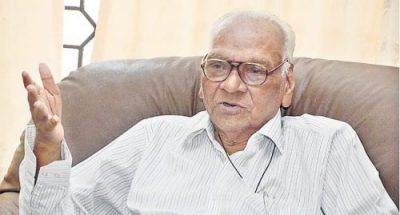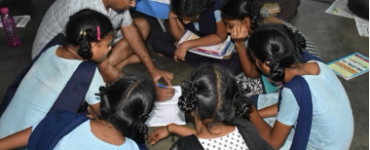Literature of any language – if not the written one, the oral literature – starts with storytelling. In its nascent form it is a folk song whose gamut encompasses the past, the present and the future. Languages have evolved, flourished and ceased, but not the storytelling. It has only changed its tradition and texture but not its essential character. Every story telling has emotion (singing), a story (theme), a narrative style (third person or first person) and a purpose (moral), which was limited solely to pleasing the listener in the first place.
The first three perfectly suited the poetic forms of literature and hence for long, up to the emergence of free verse in the nineteenth century, all stories were told in poetic forms: song, lyrics, ballads or play. When short story emerged, emotion became part of conversation between characters; story became the plot or set of events that happened or their consequences to the central character(s); and the narrative style became its compact structure (adding another dimension of objectivity on the way and assimilating contemporary events into the fabric of the story), and the purpose became wide and wild. In the words of William Boyd, there are seven dominant types into which the short story had developed over late 19th and 20th centuries: (1) The Event-plot, (2) The Cryptic / Ludic (suppressed narrative), (3) The Chekhovian (Formless story), (4) The Mini-novel, (5) The Poetic / Mythic, (6) The Modernist (Baffling obscurity), and (7) The Biographical.
Telugu short story, which followed on the heels of English short story, is no different. Dawning almost simultaneously with 20th century, it has grown in subject, experimentation, style, and social purpose like in any other language. The story has come out from the folk background into the public domain; from oral to the written. Yet its language texture continued to be classical and catered only to the literate. It took a while for the vernacular dialect or the spoken language to become the language of the story telling.
The October Revolution, the First World War, the ambience of Indian Independence movement, the Second World War, the Economic Depression and the influence of Bengali literature on Telugu short story have a lot to do with the evolution of Telugu short story from the traditional subject of reformation in Gurazada’s “Diddubatu (Emendation)” to a wide matrix of themes on social and domestic life (with subtle humour by people like Munimanikyam Narasimha Rao and Mokkapati Narasimha Sastry), inner conflicts, questioning the established institutions like marriage and man-woman relationships, classless society, exploitation of women, dalit and other minority communities and a host of other issues.

First generation short story writers like Gopichand, Karuna Kumara, Kodavatiganti, Adavi Bapi Raju, Palagummi Padmaraju, Puranam, Veluri, Chinta Deekshitulu, Kavikondala, Chalam, Ravi Sastry, Kalipatnam, Buchibabu, and Munipalle Raju handled these issues with skill, sensitivity, and experimentation in content, style and technique. Munipalle Raju is perhaps the only person who touched all the types of short story identified by Boyd mentioned earlier, and one more, the Magical Realism, which is an interplay of the past, the present and the future and the people belonging to them as was done in our epic, the Mahabharata.
Simplicity is a metaphor for late Sri Munipalle Raju. It is also the characteristic of his stories. In a way they are reflections of his self without being autobiographical. There is a Wordworthian Romanticism of presenting human nature in all its varied hues in simple, unadorned, yet beautiful style. He becomes a child while presenting the pleasant side of human nature, profuse in words and effervescent in spirit. But when presenting the darker side, he is not influenced by gloom, despair, or resignation to fate. He has a saintly detachment with his subject and characters. He never gets didactic and leaves the analysis to the discretion of the discerning reader.
According to Puranam Subrahmanya Sarma, we identify in his short stories ‘a society slowly slipping away from our knowledge and awareness.’ Raju freezes the past ‘bathed in blood’ with agony and angst. He presents them matter-of-factly. One thing this translator can personally vouchsafe for is his extraordinary memory. He could reel off the names and designations of every person he quotes in his anecdotes and events to the minutest detail. Photographic memory is not only a cliché, but a euphemism when it comes to describing his memory. If he could posit his characters so beautifully in the ambient events with such effortless ease without having to bother for inventing situations for a dramatic effect, it is only because they align themselves seamlessly from his memory-corpus once the blue print is ready for the story.
Critics and fellow writers have acclaimed him alike. C Narayana Reddy said that the realism in Raju’s stories ‘is like a friend who you can confide in’; Manjusri called him ‘a writer’s writer’; Kara commended that ‘It’s only Raju, next to Chalam, who can handle a story with imagination and style taking a totally different subject from his’; Puranam Subrahmanya Sarma said his stories are ‘tablets of musk and pills of pleasure’;Vakati Panduranga Rao compared his stories to ‘paintings with the delicate touch of a brush’; and Madhurantakam Rajaram said his stories ‘brought tears into my eyes, enlightened my soul and made me read again and again, and to others.’
Half Brother
By Munipalle Raju
Translated by: NS Murthy & RS Krishna Murthy
It’s a common experience for the regular visitors to the Officers’ Mess of Artillery Regiment to find it teeming with people. It had a very large compound, a beautiful lawn in the foreyard and, more than that, a number of very large old trees from the British times. The onlookers would easily guess that even the building was of colonial make with its long wide corridors, and the three feet radii mortar pillars of the Robert Clive era used in construction of Forts.In the tennis court behind the trees, Captain Tiwari (Tiks) and Narayanan (Niks) were playing singles. In the veranda, Rastogi (Rats) and Puri (Pickles) with their occasional shouts of ‘hurrah’ seemed enjoying tennis more than the caroms they were playing. Almost everybody had one nick name or the other. Even the Commanding Officer Colonel Jagannath, who was in his fifties, was jimmy for these youth. Of course, they would never utter the word in his presence. Then, how could Murty not have a nick name for him? He’s “Deccans” for Dakshina Murty being his full name, and “bookworm” for being a voracious reader.
Major Murty had just returned from the regiment’s playground with his white short and shirt soiled. He had great interest in the games of jawans. Selections were held for volleyball and football that evening. Being a very senior Officer, Major Murty would occasionally be given such additional responsibilities. Besides, he was a good player himself.
He being the Mess Secretary for the month, Murty gave orders to the Head-cook, Masalji, Bearers and the Boys after a brief discussion. That night it was a Mess-dinner night. All the officers of the Regiment would attend with families. As per the military convention, even the officers living with their families in the quarters are members of the Mess. There was a film show after the dinner. Everybody hated the meaningless selection of commercial pictures by Leela Jagannath, elder daughter of the Commanding Officer. This time, Captain Devgan was successful in convincing them for staging a Russian picture with sub-titles. Murty also liked art films. Though he was Secretary for both the Regimental Film Club and the Mess Library, he held the tastes of Devgan in high regard.
The Russian movie was wonderful. It was only 100 minute long. The movie was “Sisters” based on the story by soviet writer Vera Fyodorovna Panova. Everybody acclaimed that the story line, the acting and the photography were unparalleled. If Colonel patted Murty on his shoulder, in turn, Murty patted Devgan’s.
Murty was lost in thoughts for some unknown reason. Why unknown? The movie was just a picturization of some of the events of his life. The difference is only in gender… the heroine therein was Galya, a young lady. If Galya was replaced by Murty, a young man, the story would still be the same.
Galya was a tender comely girl. Her mother’s untimely death cast gloom over her life. Her father was a great dreamer. He pampered her so much. He thought that the child needed a woman’s care and married again. That was the grave mistake he did.
Her step mother was a fatty brunette. She was also a lazy bug. The moment she entered the house, she started entrusting Galya with some work or the other always. Not the routine chores. But, some hard jobs beyond her age. She never kept home neat and clean. Neither was she herself tidy nor allowed others remain tidy. In the beginning, Galya’s father tried to censure his wife. But once she started mothering his children, he changed. Now, he remained indifferent when Galya was either rebuked or abused.
Galya was getting good marks at school. She was performing on the stage as well. Her teacher Elizabeth Andre Yevana had been a great encouragement to her. The school librarian treated her with great affection. She could complete higher education against all odds. Her step mother did not want her to study any further. Her father, however, was in favour but did not express it openly. She was desperate to get out of that rotten place. With the encouragement of her teacher, Galya left for a small village near Seorophol to the theatre school in Moscow. Her only regret was about leaving behind her step sister who was as beautiful as her and also very careful. She was very concerned and worried that, left to the care of her step-mother, her sister might turn out rude and rough in her manners like her mother. Yet, she had first to get away from the nightmare.
Galya’s innate talent, creativity, and acting skills blossomed full like a flower in dew.
But somewhere in her heart she felt a nipping pain. She witnessed her father becoming a slave to drinking and occasionally her step-mother joining him. Though they were not born to the same mother, what would happen to her half sister was the cause of her pain.
Galya enacted great roles on stage; Collected fat cheques. She even acted in one or two movies. Though she did not intend to migrate to the silver screen from the stage, it became imperative. She went out on a long foreign tour for theatre festivals and returned after few months. The day she returned she saw a three-month old letter in her sister’s hand. It read: “Father had ulcer in the liver. He neglected it. Finally, he passed away on the operation table. He yearned to see you in his last moments.”
The nightmare reappeared… that rotten place… her wrestler-like step-mother with her ruddy eyes; and the death of a father who could not protect her. Somehow, she could make it to her place in flight for the anniversary of her father with small presents to her sister, her step-mother, for her teacher who now retired and to the librarian. She recalled her last conversation with the librarian requesting to issue her sister library books without any restriction. She was not sure if her sister was continuing with her studies for these ten years. She did not think fit to remember those things in her life full of insults and swept them away into the recesses of memory.
Galya paid obeisance before her father’s grave. She paid visit to her old teacher. Librarian was not there, of course. There was no change in her step-mother; she was more interested in Galya’s presents than about her. That night the two sisters shared Galya’s bed. They were talking through the night endlessly… her sister talked about the last days of her father, about her school, the economic condition of the family, how they had to live in a veranda renting out the whole house to tourists and lastly, about her own future. Galya’s hatred melted away listening to her step-sister. She was afraid to think further about her step-sister, who was already showing signs of breaking and turning coarse, should she live there any longer.
“I must take her with me to Moscow. She should obtain a good graduate degree in literature and become a lecturer there. She is so crazy about literature. She should not be deprived of it,” She had decided.
Major Murty went into his room thinking, ‘the cinema was over, but my life has just started.” He could not get sleep. All his fellow Officers were in deep sleep in the annexes to the Mess. Sometimes, even silence would not allow him to sleep.
Besides the two nick names he acquired at the regiment, Major Murty had picked up another at the military hospital. Specialist surgeon colonel Kalyana Raman and Officer Commanding Brigadier Dhawan called him “Bubbles”. He thought that he got it for his multi-lingual abilities like cutting jokes in Tamil with Kalyana Raman and in Dogree with Dhawan. In fact, he knew all dialects of Hindi… like Magathi, Khadi Bolee, Maithili, Rajasthani, and Pahadi etc. But that was not the reason for the military doctors calling him “Bubbles”. There were two one-millimeter-deep injury marks on his right temple. Though they now disappeared under his new hairstyle, they presented quite a formidable challenge ten years back when he first appeared before the Medical Board at Allahabad after passing Services Selection Board Examination. One specialist on the board recommended for detailed clinical examination skeptical of after effects of injury on his brain. Those were the moments when he perspired profusely and thought there was no light at the end of the tunnel for him.
Though they ultimately ignored the bubbles declaring them as minor playtime injuries, he knew how he sustained them: his step-mother dashed the pincers against his head while she was cooking. All that he remembered was blood streaming down from the injury. But did he know that he fell unconscious? No. But it was a shriek… a heart-rending shriek “Father! Brother is dead” by his half brother looking at the flow of blood … that brought him back to senses. Anguish! That was his life… his childhood… and his youth. Anguish… was his prayer, his supplication! That’s why sound would wake him up; Silence won’t let him sleep. A pair of wavy marks… the bubbles!
Those bubbles had taught him not to be afraid of life but wage battle to survive. Whenever he got depressed, whenever he grieved all alone, whenever he felt he was disintegrating into parts, whenever he was seized with fear and concerned about his future, he used to get recharged with energy and wisdom when he combed his hair with his fingers and caressed those bubbles. Whenever memories haunted him, he passed his fingers over the bubbles. That habit endured till he passed the second Defence Course. When it disappeared he was not aware, but then it reappeared this night… with that heart-rending shriek of a child: “Father! Brother is dead!” In the wee hours of night it woke him up untimely.
He thought it might be better to have a checkup at the military hospital after taking an appointment over phone. He did not know when his father died…nor, anything about that shrieking boy. All that he was aware and remembered was his step-mother’s bringing up. His mother’s ethereal form behind a veil of smoke … sitting in Padmasan and meditating. His mother breathing her last in that posture was his faintest memory. He consulted an army psychiatrist, when he was doing a course, about his mother’s death and about her form peeping through his childhood experiences. “Get married. You will see your mother in your wife,” he advised. He was not going to follow that.
Who should he marry? Leela Jagannath who had great liking for him? Younger sister of Kalyana Raman? She would give him unending lectures on “Silappadikaram”. Or, that tribal girl he saw at Almora, sister-in-law of Major Noutiyal?
He was the Galya of the movie. Galya had Elizabeth Andre Yevana to throw light in her life. His light was at Joshi Math… his guru Narayandutt Joshi of the Himalayas. His guru appeared for the first time in front of Triyuga Narayana Mandir on the way to Badrinath, and protected him from cold with his shawl. He was a father-like figure for him. But, even that man was not alive now! Why did he go to Himalayas at all? Barefooted, with just a towel and knickers on, his Matriculation pass book and the chapatti packed by the Math people at Hrishikesh in his satchel, and with unflinching confidence at his heart he set out.
Running away?…There were timid who run away from the war front… there could be spineless fellows who run away from their lovers … but who is so powerful as not to run away from the sharp, endless onslaught of memories!
Murty switched on the light in the library and selected a book.
From Jawan to Officer … everyone in the military service will have annual leave up to two months, a free warrant to Home or Home town; in case of Officers they would have in addition a free warrant to home village once in two years and concessional warrant another year. They need not spend their leave at home town. They could go anywhere. That’s called LTC… Leave Travel Concession.
Major Murty never had a track record of having availed leave for more than twenty days in a year. Duty… duty… duty. Where was his home? What was his home village? Books in the library were his only friends. His bosom friends! Whenever an Officer appearing for examinations approached him to get his doubts cleared, he could speak effortlessly and endlessly on all kinds of designs and war strategies from Alexander the Great to the latest, the liberation of Bangladesh.
From “Timur, the lame”, Babar, Genghis Khan, Napoleon, Wellington, Eugen Rommel, Eisenhower, Zhukov, Kornilov, to our Field Marshall Manekshaw… he would speak, and more so, about the artillery specialists Napoleon, Marshal Joachim Murat and Jean Baptiste. Zhukop capped them all… he hoisted the red flag in Berlin. Though some of his lectures he delivered about these people while he was instructor were taped, his notable specialty was his ability to speak about every war Israel had engaged in and how, in spite of it being such a small nation, it could fuse science, daredevilry with weapon strategy.
Six months after the death of his mother, his father was remarried. It was his maternal uncle who took the initiative. What his uncle’s intentions were, was not clear. Did his uncle expect that the new bride would arrest the losing string at the game of cards of his brother-in-law? Or, hoped that she would take proper care of his young nephew?
He was knocking at the doors of High School then. His step-mother was thirty at the time of her marriage. She might be conscious of the wasted away charms of her youth. She might even have thought that the boy was responsible for her plight of second marriage. He became not only her a step-son, but an avowed enemy as well. The game of cards his father had stopped briefly in the early days of remarriage, had become an easy escape for him later.
He did not take her chiding seriously in the beginning. She had coffee ten times a day. Decoction was always available on low heat on the stove. Only his father could tell which was more expensive… the coffee powder or his losses at the card game. Afraid of her, his father stopped talking to him. And in her presence, he did not even dare to look into his eyes.
After a prolonged and painful labour she delivered twins the following year. But both of them died. “This accursed fellow was the root cause of all evil”.
She made him wash the dishes, sweep the foreyard and sprinkle cow-dung dissolved water. He did not mind. He was beaten for asking money for a haircut. The following year she had another delivery. He was given double promotion and he joined High School. He was having only one knicker and a shirt with chinks under arms. When he was memorizing the sums in the sun lying down in a rickety cot, he was beaten with the broomstick for not responding to her calls immediately. She never gave him an oil-bath to head. She never let him have new clothes for festivals along with his half brother. He was “Evil fellow! Saturn incarnate”.
That’s how his step-mother prepared him for the battle of life. He never felt that he was fighting with any enemy. All his fight was with himself… with his sums… and with his life. Did he ever dream of joining military and wage a battle for life and death every moment with the enemy? But the very thought that he would ultimately succeed one day excited him. His confidence multiplied after he came to senses listening to the pathetic shrieks of his half brother. He knew… he would never be humbled. Never!
He reached his maternal uncle’s house once the injury healed with the support of his friends. His books were his pals. Though his uncle did not utter anything, his aunt did not hide her disapproval. That year… amidst all tension… he secured first mark in mathematics and first rank. An artillery Officer should have a good grasp of projectiles. Where to position his gun… the approximate distance of the enemy target… the wind speed… flight direction of the cannon…since the cannon would describe an arc instead of going straight… everything needs precise mathematical calculation. Perhaps mathematics is imperative in every walk of life!
His hopes at further study receded… but not his confidence in himself. The following year he got admission into a Vysya hostel with the recommendation of some Good Samaritan. Vysyas helped him up to his Matriculation. They even offered him employment in their shops competing with one another. No. He did not want to stop at that. He aspired for more… and more.
Pilgrims who stayed in the hostel once offered to take him with them to north. At Varanasi, where they returned, he bade them goodbye refusing their offer to take him back home. He walked barefooted in the Aryavartam… Walked through legendary villages Hardwar, Hrishikesh, Lakshman jhoola, and was back to Prayag for Kumbh Mela. What a great spectacle it was! Oodles of people flocking together with indomitable faith and unshaken determination. He followed the village folk to a nameless destination.
“Paradesi! Paradesi!” (Not a native! Not a native!”)
Meal was assured sometime during the day.
“Child! Where are you going?”
On his way back from Badrinath, he lost everything except his blanket, bowl and the Matriculation Marks Book. Whatever he was left with … was enough. He was not sure why Narayandutt Joshi liked him. He learnt there how to milk a cow. His house was a veritable trove of Sanskrit and Hindi books. The next turn in his life was the letter Joshi gave recommending him to his elder brother in Varanasi. Joshi’s brother was a Panda (Purohit) there. Panda was very rich. He had even an elephant and a Palanquin. His was a forty-room mansion with an endless flow of pilgrims.
Panda asked him only one question: “What’s your Gotram (lineage of Rishis)?”
He replied.
“Your people for the last three generations had stayed in our house,” he said.
He was at ease reading Devanagari. He found the names of his grandfather and great grandfather under his Gotram in the books on the attic. It was with the recommendation of Panda that he secured admission into the college… and into the University. There again, he faced challenging sums. But, he was never vanquished.
Panda even looked a bride for him. He politely refused and took leave. Panda was angry. He was back to Joshi at Joshi Math.
A friend of Joshi gave him a word of advice. That was his first application form … for the selection of Commissioned Officers in the military. Joshi did not allow him to touch the form till he performed Ganesh Puja. Joshi performed his Upanayanam qualifying him to perform the annual rites of his mother at Gaya. By the time he returned from Gaya, he found orders directing him to attend training at Deolali. Training! Training!!Training!!!
His knowledge of mathematics came in handy everywhere. He was appointed Captain. He sent the first cheque from his salary to Joshi. And he took his army veterinary surgeon Srivastava to Joshi’s house during his annual leave. The veterinary doctor examined the cows of Joshi and recommended buffaloes to run a dairy farm. He sent a separate cheque to Joshi for the purchase of five buffaloes. But Joshi returned half of it to him. He enclosed along with it his horoscope he received from Varanasi. He did not even give a cursory look at it and hid behind his books… between the pages of “Kamayani”.
He wrote a long letter to Panda seeking his pardon. He was not aware until then that he could write such good Hindi. He received a prompt reply…in a Sanskrit Sloka. It means: Only great people shall consciously cultivate the spirit of gratitude. The man who receives it, and can still remain humble shall rise higher still.” That was followed by blessing: “Death shall keep its distance from you. I shall see you in a high rank in the military.”
He sent a German transistor and the two Assam-Monga blankets he bought in Nagaland through a special messenger to Panda; but never did his house or his people come to his mind. He was always referred to as the adopted son of Narayandutt Joshi. That Joshiji was no more now.
Just as his familiarity with literature increased, his familiarity with the country had also increased thanks to LTC for a homeless man like him. From Kajiranga to Kanyakumari… he was able to watch firsthand the sculpture and architectural beauty and the natural resources that influenced the history of this country through ages only because of his military service. Whether it is 150 MM gun or 130 MM Bofors it must bow its head before “Major Murty, Artillery, AVSM”. But after he understood Galya, the layer of pride with which he grew…that he was never vanquished … was slowly molting and, in the silvery moonlight was looking like his shadow in water.
A letter from his half brother in irregular hand… stamp marked almost a year back. How could he secure his address! “Brother! Father expired. Lands were auctioned. Mother says that we are not solvent still. We are on hard times. Sister failed again.” And there was post script to it: “Brother! I long to see you in uniform”.
That letter did not stir any emotions in him… did not excite him. After a fortnight he sent a thousand in an Insured Cover. He did not enclose even a perfunctory courtesy note to it. Even when he sent his contributions to the Vysya Hostel or when he sent a draft for the six-month expenses to his maternal uncle, he did not remember his aunt, his half brother or the half sister he never saw. They just did not exist for him.
But this Galya was an obstinate lady… she left his mind greatly disturbed.
In his search for sleep he consulted not one book … he picked “Vaitalikulu” by Muddukrishna, “Madhusala” by Duvvuri Ramireddy, “Sateesmruti” by Koduri Subba Rao, Vedula Satyanarayana Sastry, Rayaprolu, and Jashua from Telugu, which he purchased while he was at Golconda; Jayasankar Prasad, Mahadevi Verma, Dwivedi, Chaturvedi from Hindi… but no use. None of them helped him get sleep. Instead, they all seemed to say: “there’s past … there’s present… and so there’s future. He who could not realize this is not a complete man.”
Major Dakshina Murty received his promotion orders rather late… as Lieutenant Colonel. He is Officer Commanding to a new Unit. He should take charge within one week. But he was in no hurry.
“Why do you need leave now” Colonel Jagannath asked Murty, without restraining his laughter. He knew Murty had always said ‘no’ whenever he was offered leave.
“Sir! I must join my brother in a decent school. He would come to nought if I were to leave him there,” said Major Murty.
“Savati Tammudu” first published in Andhra Prabha Sachitra Vara Patrika (27.2.1991)









Add comment